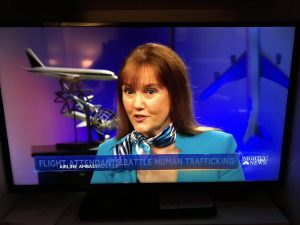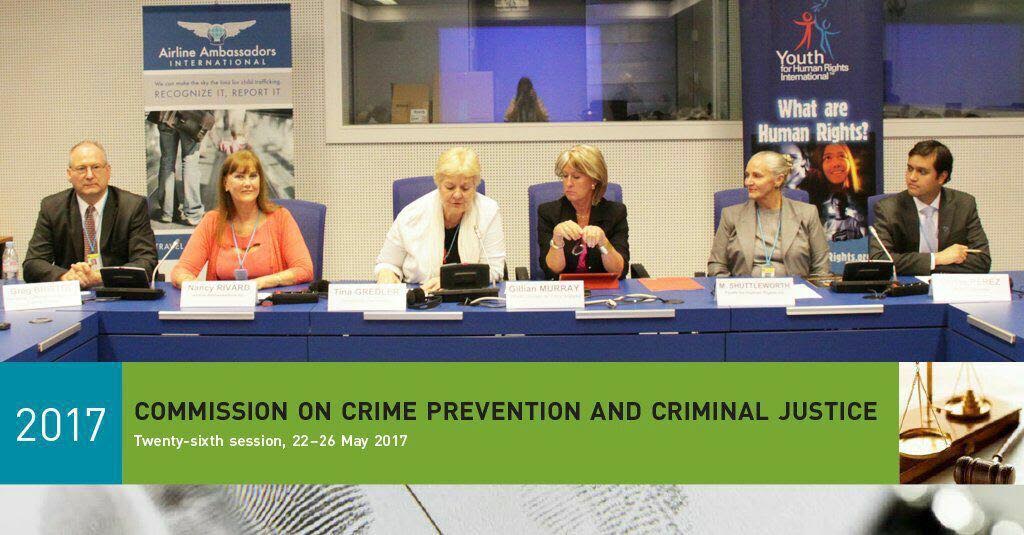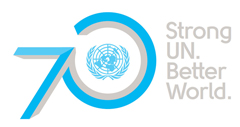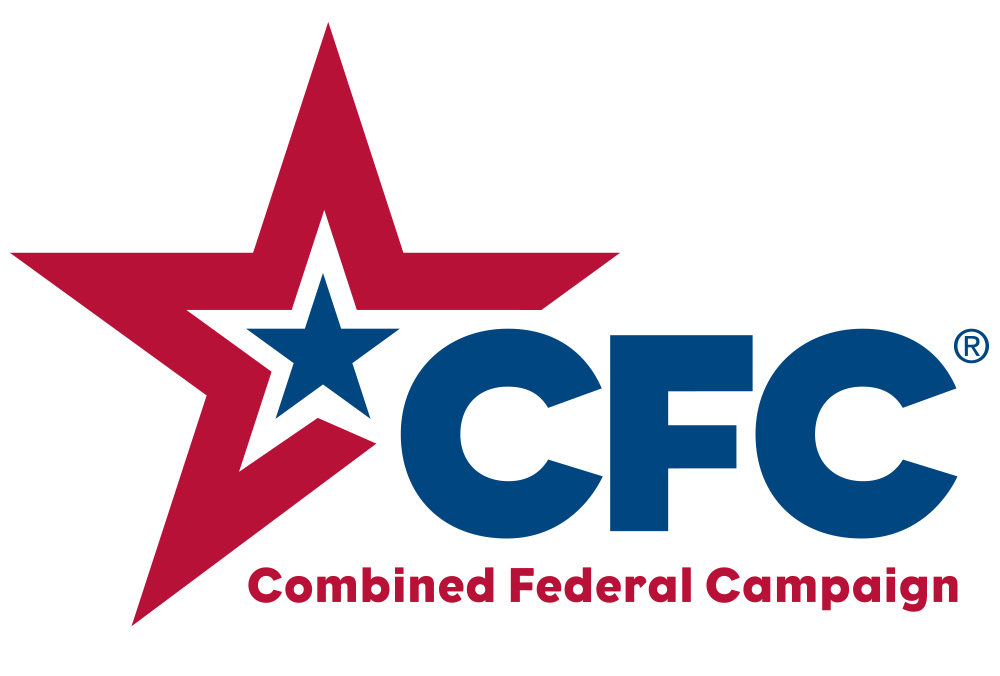Testimony to U.S. Senate Committee on Commerce, Science & Transportation
Force Multipliers: “How the Transportation Industry can Combat Human Trafficking”
The critical infrastructure of our transportation system can no longer be used as a tool to implement human trafficking, or modern day slavery. This is also the fastest growing crime in the world. It is linked to drug trafficking, human smuggling, arms trafficking and terrorism, also; human trafficking aboard aircraft is a cabin safety issue.
Traffickers often use the speed, convenience and comparative safety from detection of commercial air travel. The International Air Transport Association (IATA) shows 3.6 billion global passengers in 2016 and U.S. serving airlines carried 928.9 million domestic and international passengers..
Airline personnel can be ‘eyes in the skies” providing vital intelligence to law enforcement. They can be a force multiplier in the fight against human trafficking. One flight attendant interacts with a minimum of over 500 passengers per week. This translates to 24,000 passengers per year.
Airline Ambassadors International (AAI) was established in 1996 as a non-profit organization made up of members in the airline industry. AAI has led advocacy on human trafficking awareness since correctly identifying trafficking on four flights in 2009. Working with Congressional members and government agencies they developed an “industry specific” training, which has been provided to 5,000 frontline personnel at 57 U.S. airports and international locations. This training is provided by volunteer flight personnel and survivors of human trafficking and is consistent with the “Blue Lightning” protocol of the Department of Homeland Security.
The story of an Alaska Airlines flight attendant, Shelia Fedrick who saved a little girl with a note in the bathroom, went viral in February 2017 with over 2,000 media citations. Shelia is an AAI trainer and this is only one of dozens of stories of victims who have been saved as a result of these prevention efforts.
Airline Ambassadors International commends the leadership of Senator Thune for the FAA Reauthorization Act of 2016 (S.2658) which includes the requirement that flight attendants be trained to identify and report potential trafficking aboard flights. Since the new legislation, most airlines have now adopted a human trafficking policy and have implemented a minimum level of training for flight attendants. However, there is still more work to do to strengthen this momentum.
PROBLEMS STILL NEEDING SOLUTIONS
AIRLINE INDUSTRY
Oversight
There is not adequate oversight evaluating effectiveness of training on human trafficking awareness in the airline industry. There is not motivation for companies to ensure maximum effectiveness of such training of flight attendants, or to train other critical employee groups at major human trafficking transit hubs, including airports.
Flight Attendants
Positive momentum has begun with several airlines adopting the DHS Blue Lightening computer based training, or a few slides in the on line portion of recurrent training. However many airline professionals have said they do not pay close attention to on line trainings and the typical flight attendant glosses through on line trainings as fast as they can, and very little of the information is retained. The issue of human trafficking awareness is not even mentioned by the training staff of most U.S. based airlines during annual training. Emphasis by trainers is needed in recurrent training.
Pilots
When flight attendants report suspected trafficking situation on board they are to inform the pilots, who are to radio the upcoming airport, to contact law enforcement for evaluation. However, in two recent cases the pilots refused to report despite the fact that flight attendants were concerned and the procedure was in their “In Flight Manual”. The pilots stated that they were reluctant to cause a problem for the passenger and the suspected trafficker and victim deplaned unhindered. . This issue needs to be addressed in pilot recurrent annual training so pilots will feel comfortable following the procedure.
Operations personnel
Operations personnel are also not trained. Their responsibility is to monitor hundreds of flights arriving at each major airport location. When questioned recently on what action would be taken if a pilot radioed in a potential human trafficking on the flight, one supervisor replied that he would take no action, as this issue was not related to aircraft security.
Passenger Service Agents
Agents also see trafficking indicators when interacting with customers checking in for flights and are not trained how to respond. Some have shared that they have seen many potential cases but did not know who to report to and were even concerned about risking their jobs. Many have said they would like training so that they know what is expected of them, and most are quite willing to act.
Lack of Corporate Commitment
Although the private sector is critical in this fight, most airlines truly do not understand the importance of human trafficking awareness and hesitant to integrate new actions into their corporate cultures. They are nervous that vigilante flight attendants will make false accusations and cause a lawsuit. They have no motivation to ensure proper training for employees, eliminate trafficking in the supply chain or adopt policies on this issue that include providing of training and job opportunities for victims. When AAI sent a letter on April, 2017 to the CEO’s of 24 airlines and hospitality companies to support human trafficking policies and being open to hiring survivors – there was no response.
Data Sharing – Law Enforcement
The Department of Homeland Security was created under the Patriot Act to coordinate information among agencies and partners to secure our critical infrastructure, but this information is not shared. Despite formal FOIA requests for how many tips came from airports where trainings were given, no information was shared and thus, evaluation of training programs cannot be measured. Although details of law enforcement cases should remain confidential, the sharing of information on how many tips were received, and if they led to arrests or prosecutions would provide valuable data for NGO’s, airlines, academia and the American public.
Reporting Mechanisms
The current public reporting systems for receiving human trafficking “tips”, cannot receive data rich information from the partners that is seeks to empower. For example, AAI employs a smartphone application that can transmit encrypted trafficking data in critical real time, but law enforcement and NGO partners cannot receive such data, including video, recordings, text and pictures.
Department of Homeland Security has spent millions of dollars on an excellent advertising campaign on human trafficking awareness with posters highlighting sex, domestic servitude and labor trafficking, but
- The reporting phone number is different from the National Human Trafficking Hotline (NHTH ) # which is confusing for the general public.
- The DHS Hotline is not a direct number
- Although the National Human Trafficking Hotline can receive texts there is no mechanism to receive data rich information by either Hotline, which many AAI trained professionals are equipped to provide.
Recommendations
Oversight
- The relevant critical infrastructure oversight agency (FAA or DOT) should be established to provide minimum results based educational standards to oversee compliance to human trafficking training for airline transport industry.
Enhanced Training for Airline Personnel
- Minimal, on line training should be supplemented with classroom mention and training should be required for all frontline or relevant employee groups – flight attendants, pilots, operations personnel and passenger agents.
- Legislation to require airlines to train staff could provide resources for live Train the Trainer programs on human trafficking to training staff of major U.S. based airlines. Such training should include live participation of survivors of human trafficking to make the issue come alive for trainees, so training staff of each airline will understand the issue and emphasize it during annual recurrent trainings.
Corporate Commitment
- Legal protection offered to airline and employees who report potential trafficking be established along with a reporting protocol to FAA or the Department of Transportation.
- Tax incentives be considered for companies for providing minimum standards in compliance to combat human trafficking, (including training of employees, elimination of trafficking in the supply chain and willingness to provide jobs to victims of trafficking.)
- Federal government consider providing incentive to airline companies by deciding to book government travel only on those air carriers meeting minimum standards for corporate social responsibility in this area.
Data Sharing
- A system be established to measure the number of trafficking tips received from airports, airlines and airport employees and number of “tips” which lead to actual cases and prosecutions.
- That data be shared with relevant partners or academic institutions for evaluation.
Strengthen Reporting Mechanism
-
- Establishment of an email address to be monitored 24/7 as a system for reporting potential human trafficking “tips” for quick response and the ability to receive data rich information – phone, text, email, pictures, video and geo-location to ensure prompt action and the ability to receive rich data – rather than just a phone call or text
In the words of the Association of Professional Flight Attendants, APFA: largest flight attendant union in the United States:
“We are committed not only to preparing our membership to recognize and report suspected instances of human trafficking, but also to raise public awareness of the problem. Flight attendants have thwarted these criminals in the past, but putting an end to human trafficking will require a coordinated and sustained effort as well the commitment of the entire transportation industry.”







